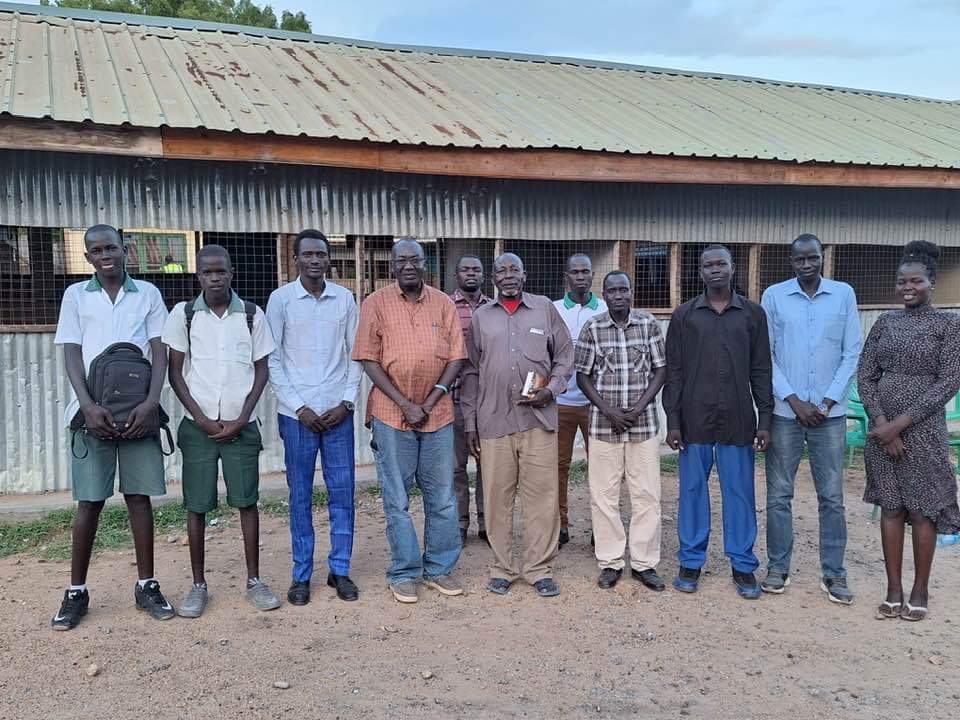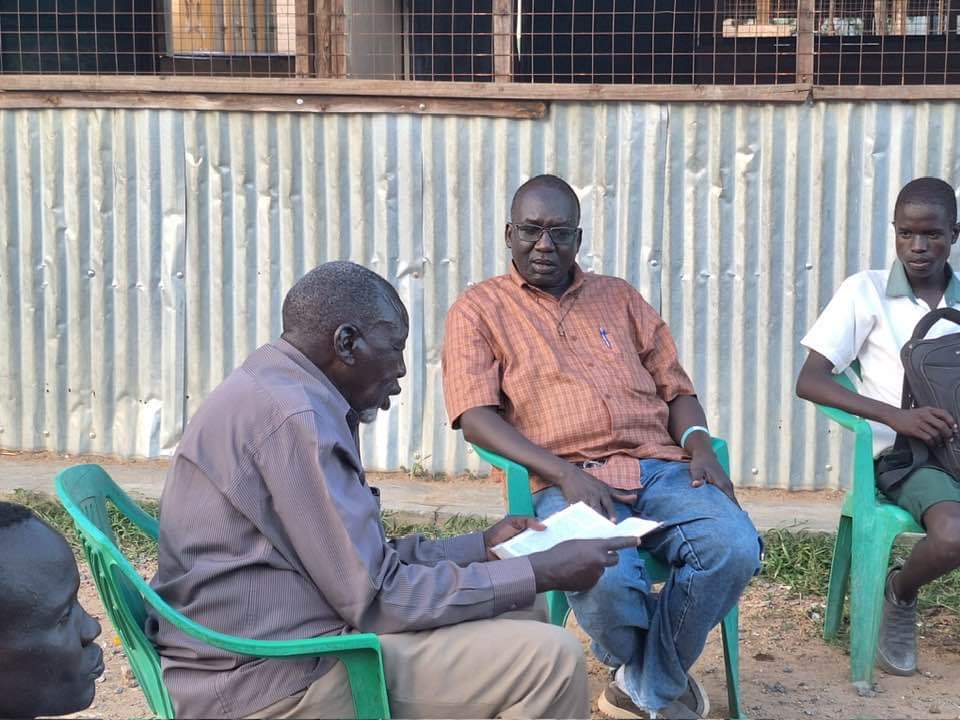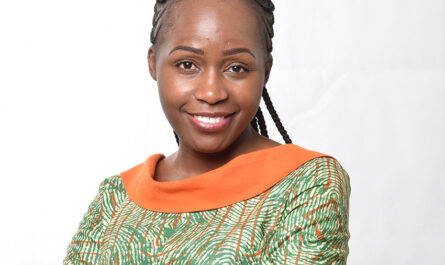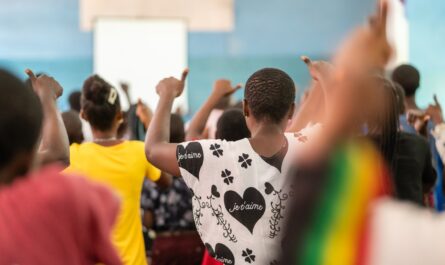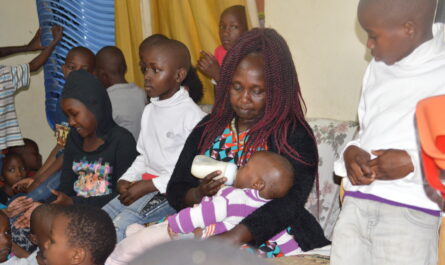The 456 pupils of Good Shepherd Academy (GSA) in Sherikat, about 9km from Juba City, love it when they are in school. Even on Saturdays, they’re happy to attend tuition and other out-of-class activities in the safe space of their school. For Father John, the sheer joy of educating these kids is worth the sacrifices he makes.
It is Saturday and the children are happily practising a traditional dance and Christian songs that they will present to parents during a thanksgiving function.
Father John drives into the school compound. Scores of children swarm around him, talking excitedly in English. They want to get their pronunciations right.
“I love it here, we learn to write and to speak,” says 11-year-old Emmanuel, in Grade Three.
The children can speak Arabic and different vernacular languages but lessons are conducted in English. There are 23 tribes represented in the school out of the 64 tribes in South Sudan, who hardly get along due to tribal conflicts. Father John, as they call him, wants them to learn how to work together and also learn Swahili, the official language in East Africa.
Reverend John Chol Daau, 47, is an Anglican priest and one of the Lost Boys of Sudan.
But he is lost no more. Not only has he found a new life in God, he also is on a mission to not only ensure many in South Sudan know the liberating gospel of our Lord Jesus Christ but to also develop and empower Christ-centered leadership by training the next generation of leaders for the new nation.
The plight of suffering children is heavy in his heart because he was one of them. When civil war broke out in southern Sudan in 1983, over 20,000 young boys found themselves orphaned or separated from their families and villages, fleeing for their lives. Some as young as four. They joined groups of refugees, wandering in and out of war zones for the next four years, walking thousands of perilous miles. About half of them died from militia attacks, disease, starvation, dehydration and exhaustion. Others were mauled by wild animals or drowned in river crossings. Eventually they reached safety in Ethiopia but in 1991 war in Ethiopia once again sent the young refugees fleeing. Some 10,000 boys aged between eight and 18 eventually made it to the Kakuma Refugee Camp in Kenya.
The survivors of this tragic exodus became known as the Lost Boys of Sudan.
“I was born in Khartoum, Sudan. My family moved back to Baping, north of Bor, the current capital of Jonglei State in South Sudan. When the war broke out in1983, and rapidly extended into villages in 1988, we fled from our village of Baping, and trekked hundreds of kilometres to neighbouring Ethiopia,” he remembers.
He was 14 years old and saw firsthand the death and devastation of war.
“The young and those too weak to keep walking fell off the trek, left to die in the wilderness,” he recalls as he tried to hide his emotions.
John spent 13 years at the Kakuma refugee camp because his country was still unstable, where he received basic education. In 2001 he got a scholarship to join Daystar University in Kenya, where he earned an associate and Bachelor’s degree and eventually joined seminary in the USA, where he was awarded a Master of Arts in Religion at Trinity College, Pennsylvania.
His story is captured in his biography that he co-authored with Lilly Sanders Ubbens “God’s Refugee”, published in 2016 by Hartline Literary Agency, and with a second edition in 2022. John is also featured in the film, “Christians in the Mirror”, and “The Lost Boys of Sudan” which chronicle the arduous journey through the war and into the US.
One of the documentaries won several awards at the 2006 Sundance Film Festival, and earned John a measure of fame and goodwill.
What he is doing
South Sudan, the newest democracy in the world, has some of the worst education indicators globally. Only one girl in ten completes primary education. Girls comprise just one-third of the secondary school population.
“The number of orphans is high, hence they have no means of paying for their tuition,” Father John says.
That marked the beginning of Good Shepherd Academy. The school opened its doors in 2016, but the joy was short-lived as conflict revisited the newly independent nation, disrupting what was becoming an otherwise normal routine. Juba was quickly deserted as children and parents fled the chaos, going back to internal displacement camps. It would be a long wait, one of uncertainty.
ReliefWeb notes that since the outbreak of conflict in 2013, South Sudan has remained in the grip of a humanitarian crisis, with nearly 400,000 people dead.Over a million people were forced to leave their homes. In 2018, a shaky peace agreement – the Revitalised Agreement on the Resolution of the Conflict in the Republic of South Sudan (R-ARCSS) – was reached between the South Sudanese government and its main political opposition. The deal offered some hope for peace, including the first general elections, scheduled to take place in 2024.
Now children enjoy studying in newly built stone-walled classrooms at GSA, that were built through donations. Initially, the children used mabati (tin roof) classrooms, which can easily become uncomfortable in temperature highs of 35 degrees Celsius during the day. “Each school year costs under 200 USD in tuition and lunch fees. The money is used to fix hot lunches for the children so that they may stay in school till the end of the day.”
Walter, a Kenyan, says he loves teaching at the school. “The children are eager to learn. Fr. John is keen on the number of students per class. At GSA, the admission process is strict, and priority is given to students nearby and orphans.”
The institution has also come to the aid of its host community. Water-borne diseases are rampant in the country and access to clean water is a mean feat despite the fast-flowing Nile being just a few kilometres away. In 2018, a Good Samaritan donated funds to sink a borehole for the children. The 20,000 litre capacity borehole uses solar technology to get clean and safe water for the children and the community neighbouring the school. Today, the institution shares the rare commodity with its host community at no charge. Unfortunately, lately the school and community have been without water after the borehole clogged, and the submersible pump got damaged. Efforts are underway to restore the borehole to continue providing safe, clean water.
“Fr. John works hard in an extreme heat and hardship in Juba, South Sudan. We have no idea how stressful life in Juba can be, but John is so encouraged by your support, especially your prayers. They are devoted to see that their ministry helps facilitate and bring Jesus and a good education to the people in South Sudan,” said Barbara Nelson, president of the Good Shepherd Educational Foundation.
Onto some good news, the Anglican Relief and Development Fund provided 130 solar-powered flashlights to the children in upper primary school to use for their studies at home at night since they do not have electricity. In South Sudan, less than two percent of the population has access to electricity, commonly produced by diesel generators and solar panels.
“It is such a blessing to be part of healing and nation building. John’s other commitment is work of peacebuilding and reconciliation. He travels in the country and outside the country advocating for forgiveness and reconciliation among the church leaders,” added Barbara.
As a result of his work, he has received many awards, which have supported his work in South Sudan.
How to pray and support
- Top on John’s prayer requests is good health for him, the teachers, students, and the community. Malaria is a common illness in South Sudan and between May and July, over 60 children at the school have come down with malaria. Unfortunately, the end of July, they lost a boy in Class 5 from malaria and diabetes. He is raising support to provide mosquito nets to the children.
- He trusts the Lord to provide a good head teacher, an assistant director, and a grant for training for peacemaking and reconciliation.
- For the school’s growth. John has already secured enough space for expansion including construction of a chapel, a play space and a reading facility.
- You can reach out to Reverend John Daau at: johnchol@hotmail.com and mobile numbers: +211 928 486 861 and +254 721 304110
